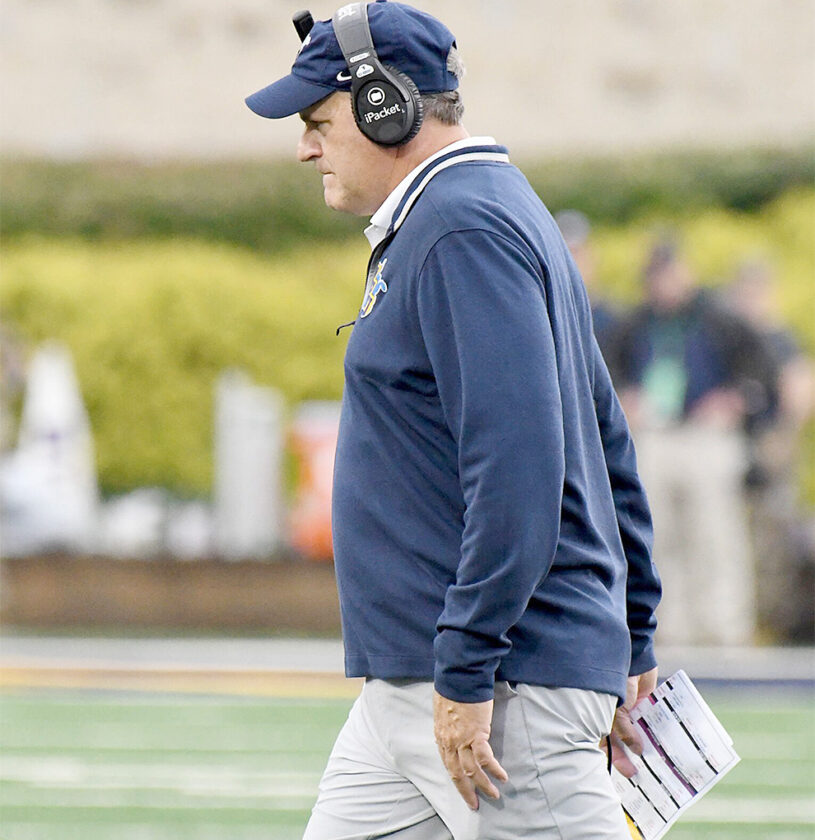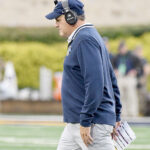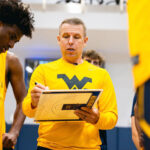The challenges of coaching at your alma mater

File photo WVU coach Rich Rodriguez is shown during a game from earlier this season.
MORGANTOWN –West Virginia University’s football team has played in every type of bowl imaginable, from fruit bowls honoring the Peach and Orange to condiments like Sugar and Mayonnaise, from honoring animals like the Gator to industries such as the automobile with the Carquest, Car Care and the Continental Tire bowls.
Geographically they have been nearly everywhere from New York City to New Orleans, from Atlantic City to the music city of Nashville, from Atlanta to Phoenix to Dallas to El Paso, but they take part in a new, if unofficial bowl, when they square off in what well may be termed the “Recycle Bowl”, which matches West Virginia and UCF in a 1 p.m. Game on TNT Saturday.
Both teams are struggling, WVU with three straight Big 12 losses and a 2-4 record starting the second half of its season off a bye week while UCF is also 0-3 in conference play and 3-3 overall.
What you have is two coaches trying to disprove the novelist Thomas Wolfe’s novel that was titled “You Can’t Go Home Again” in West Virginia’s Rich Rodriguez and UCF’s Scott Frost, each in the first year of their return to the school they used to jump into an elite job as a college football coach.
Rodriguez, of course, cut his teeth as a major college head coach at his WVU alma mater, taking over from the school’s Hall of Fame coach Don Nehlen and rebuilding it so that it climbed to within one win of playing for a national championship before suffering a humiliating defeat against rival Pitt and leaving to take the challenge of coaching the Michigan Wolverines.
Rodriguez was in Morgantown for seven seasons the first time around, ending his stay with teams that had three consecutive 11-win seasons to give him a 60-26 record as he exited.
After 11 years as an assistant coach, rising to offensive coordinator at Oregon where he ran one of the nation’s top offenses, Frost landed his first head coaching job at UCF in 2016.
The Knights were playing the competitive Florida market where Miami, Florida and Florida State were all national powers, and Frost was asked to deliver them to prominence and, after a 6-7 debut season, put together a 13-0 encore season that had some claiming a national championship.
But it was Frost who really benefitted from that season as Nebraska offered him a chance to come home. Born in Lincoln, Nebraska, he had impeccable college coaching having played for Bill Walsh, of Super Bowl fame, at Stanford and then for another Hall of Fame coach in Tom Osborne at Nebraska.
Like Rodriguez, his experiences were not what he had imagined after establishing himself at UCF.
While Rodriguez wound up wandering through football head coaching jobs at Michigan, Arizona and Jacksonville State in Alabama and taking on some collegiate offensive coordinator jobs, Frost wound up figuratively speaking his size 6 ½ shoes in Osbourne’s size 13s at Nebraska.
What he had hoped would be glory days turned into gory days in Lincoln, suffering through four-plus losing seasons, finishing his career being fired after three games in 2022 with a record of 16-31, going just 10-26 in the Big Ten Conference and 0-14 against ranked opponents.
In the shadow of Penn State’s firing of James Franklin in mid-season after all the success he brought to the school one might say that in today’s financial era of college football where winning is not an option to remain employed, Nebraska showed a good deal of patience with Frost until he finally was upset by Georgia Southern.
Each coach and each school is trying to recapture past glories and are doing so in an era where it’s expensive to be wrong.
“Going home isn’t always easy. Going back isn’t always easy,” Frost said during Big 12 Media Days, sounding maybe more like Robert Frost, the poet, than even Thomas Wolfe. “This was an easy choice for me.”
Rodriguez, of course, was quizzed about that himself at Media Day.
“The opportunity to go back home and finish my career at the place where I played at, the place I coached at, is really neat,” he said. “I probably don’t say it enough, I am very, very grateful for this opportunity. I take it very seriously.”
Going home is never easy for anyone. The home folks always have questions of why you left in the first place and why they wanted you back.
It’s something Rodriguez has had to accept more than Frost, his departure for Michigan being a 10 on the scale of controversy.
It has been done probably more than you think, much of it with coaches who left to serve in the Armed Forces during World War II.
There have been Hall of Fame coaches who have exited stage left, then returned. There have been successes and failures, the largest failure probably taking place 80 miles north of Morgantown with Johnny Majors and Pitt.
Majors coached four years at Pitt after having spent five seasons with Iowa State. He won consecutive national championships with the Panthers in 1975 and 1976 before his alma mater, Tennessee, hired him away. He distinguished himself more with a 116-62-8 record in 16 years with the Volunteers.
In 1993, he returned to Pitt. Unfortunately, he couldn’t bring Tony Dorsett back with him and had four dismal seasons with the Panthers.
Frost’s college coach at Stanford, Bill Walsh, served two terms there around becoming an NFL Hall of Fame coach. John McKay, a West Virginia native, did the same at USC.
Among the most successful was Bill Snyder at Kansas State, built a winning program where none had existed before retiring, saw it slip back into obscurity and returned to turn it into a Big 12 contender before enjoying a second retirement.
That was probably more abnormal than normal, though, as being a winning coach in a place such as WVU or Central Florida is hard enough once, let alone twice.


